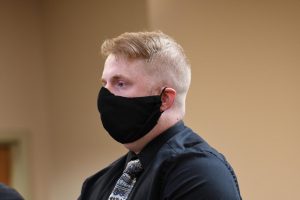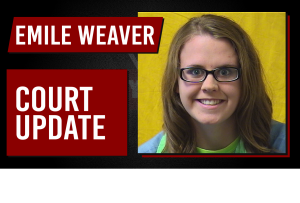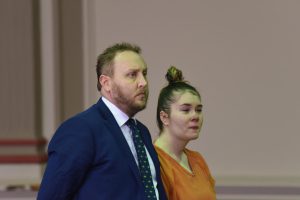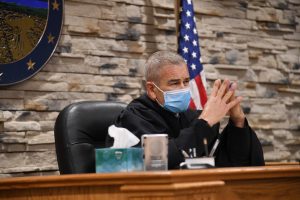Vacant federal positions in Ohio likely to remain into 2023 as Vance takes office
November 30, 2022
It appears the Northern District of Ohio, which covers Cleveland, Toledo, Akron and Youngstown, 40 counties in total, will remain without a U.S. Attorney, presidentially appointed and senate confirmed, until new members of Congress take their seats this upcoming January, including Senator-elect J.D. Vance.
While the U.S. Senate will remain controlled by Democrats, the process to select the next U.S. Attorney for the Northern District of Ohio could become complicated as Senator Sherrod Brown, a Democrat, faces the reality of a contentious reelection in two years, as Ohio this November shifted from its historical place as a swing state to a solidly Republican-held state. Vance, a more conservatively aligned politician than his predecessor, Senator Rob Portman, also a Republican, could make Brown’s recommendation for a moderate-to-liberal nominee to President Joe Biden (D) as one of Ohio’s two top federal prosecutors a challenging endeavor.
Brown’s former nominee, Marisa Darden, who was appointed by Biden and confirmed by the Senate earlier this year was weeks away from taking office when she made the unusual announcement that she would withdraw her name from consideration prior to taking over the position to prioritize her family and return to private practice. Darden was one of three federal prosecutors recently named by former DEA Agent Jose Irizarry as having attended parties in which other individuals, including federal agents, allegedly did illegal drugs. Irizarry has been called ‘DEA’s most corrupt agent.’ Irizarry did not accuse Darden of using illegal drugs herself, however, as she had to go through a somewhat rigorous FBI background check, the revelation draws into question the value of such inquiries on federal nominees. It’s possible, though unlikely, that Darden could face criminal charges, if she attempted to conceal or lied about knowing of other federal officials partaking in illegal acts during her selection and confirmation process.
As previously reported by Y-City News, Ohio is comprised of two federal judicial districts, the Northern District of Ohio (N.D. of Ohio) and the Southern District of Ohio (S.D. of Ohio), each having roughly equivalent populations. The Northern District of Ohio represents the 40 counties generally north of Columbus and the Southern District of Ohio represents the 48 counties south of that boundary including Columbus, Dayton and Cincinnati.
Unlike elsewhere in Ohio, such as at the state, county and local level – in which the ultimate legal authority lies with elected judges and prosecutors, at the federal level, judges and prosecutors are nominated by the President of the United States and confirmed by the U.S. Senate.
Federal judges serve lifetime appointments and are not age-limited like their counterparts in state courts, such as Ohio, where its constitution prohibits an attorney from beginning a judicial term after turning 70 years old. Federal prosecutors serve terms typically less than a decade, with technically four-year appointments, though few fulfill that 48-month period due to delays in confirmations, which can often take as long as two years, among other reasons.
Like federal judges, federal prosecutors nearly always come from the same political party as the current sitting president when they are appointed. The top federal prosecutor in each of the 94 federal districts is referred to as the U.S. Attorney.
In the Southern District of Ohio, for example, Kenneth L. Parker was recently selected by a committee established by Senator Brown, affirmed by his counterpart Senator Portman, nominated by President Biden, advanced by the Senate Judiciary Committee and confirmed by the U.S. Senate. He replaced David M. DeVillers, who was appointed by President Donald Trump, a Republican, and tenured his resignation at the request of the Justice Department so President Biden could begin the process of naming his successor, Parker.
Some districts, like the two in Ohio, receive little to no fanfare, and as a result, often once a nominee is chosen, they advance without compilation or interference. Some districts like the Southern District of New York, which handles most large financial crimes, and the District of Columbia, which handles all federal and local crimes committed in the nation’s capital, are highly contentious. Justin Herdman, for example, who served as the U.S. Attorney for the Northern District of Ohio under President Trump from 2017 through 2021, was selected in 2020 by the former president as the nominee to be the United States Attorney for the District of Columbia, however, that appointment never materialized with a confirmation in the U.S. Senate.
In the period between when a U.S. Attorney resigns and another is confirmed by the U.S. Senate, there is an interim administrator, often the office’s First Assistant U.S. Attorney, who becomes the Acting U.S. Attorney. They have nearly the same power and authority as the nominated and confirmed U.S. Attorney.
In the Southern District of Ohio, for example, Benjamin C. Glassman took over the position in 2016 from Carter M. Stewart, the U.S. Attorney appointed by President Barack Obama, a Democrat, who served from 2009 through 2016. Glassman was appointed by Attorney General Loretta Lynch during the final months of the Obama Administration and the United States District Court for the Southern District of Ohio allowed Glassman to stay at the helm until Trump nominated his successor and he was confirmed by the U.S. Senate.
Greg Hartmann was Portman’s original recommendation to President Trump for nomination, however, complications arose due to Hartmann’s business ties among other issues, such as his previous public comments about Trump, that ultimately railroaded his nomination. Hartmann was a former Hamilton County Assistant Prosecutor, the Hamilton County Clerk of Courts and a Hamilton County Commissioner. Typically, but not always, the Justice Department and the nominating president prefer a candidate who has experience working as an assistant U.S. attorney, which Hartmann did not have. It is accustomed that nominees meet with the attorney general, as well as other Justice Department staff, as part of the nomination process.
In 2019, after more than two years of inaction on behalf of advancing Hartmann, Senator Portman recommended Assistant U.S. Attorney DeVillers to President Trump for nomination. DeVillers was confirmed by the U.S. Senate and served from 2019 through 2021. Vipal J. Patel served as Acting U.S. Attorney in 2021 from March through November, when Parker was sworn in as the district’s newest U.S. Attorney.
The senator or senators from the same party as the president typically are the one(s) to advance a candidate to the president, often after the recommendation from a select committee, to become the district’s U.S. Attorney. In situations like in Ohio, where there is one Republican senator and one Democrat senator, the member of the other party from that state gives their blessing. This can sometimes be referred to as a Blue Slip Approval, which traditionally is more commonly known for judicial nominees, but essentially requires both home senators to approve of a nominee, or else the candidate’s likelihood of surviving a confirmation process is severely impacted.
While the opposing party’s same-state senator may not agree with the nominee, they in almost all cases support the selected candidate as they will potentially need the other party’s support at some time in the future. In cases where both senators are from the opposing party, there is typically, but not always, a compromise made, for example in North Carolina, where both senators are Republicans but the current sitting president is a Democrat, thus the two senators have worked with the White House to select qualified selectees to recommend to President Biden for the state’s three judicial districts, all of which have been confirmed by the U.S. Senate. In Flordia, as another example, U.S. Senator Marco Rubio established a bipartisan selection committee that has been able to select two of the state’s three judicial districts with a nominee that the President approved and nominated. The state’s other Republican U.S. Senator, Rick Scott, neither confirmed nor rejected Rubio’s bipartisan selectees, but established his own separate screening commission. In yet other states, such as California, the two U.S. Senators, Dianne Feinstein and Alex Padilla, both Democrats, each also set up separate selection committees, creating gridlock for an eventual presidential nominee. To date, only two of the four judicial districts in California have nominees even though both senators are from the same political party as the president.
The situation facing the Biden Administration in the Northern District of Ohio is a unique conundrum that rarely, if ever, happens. Following former President Trump’s loss to now President Biden, the former U.S. Attorney, Justin Herdman, nominated and confirmed under Trump, was asked to resign by the Justice Department, which as aforementioned, was expected and is commonplace. As Biden is a Democrat, Ohio’s sole Democrat U.S. Senator, Sherrod Brown, selected Marisa Darden as a candidate for President Biden, who nominated her and sent her appointment to the U.S. Senate for confirmation. Meanwhile, Bridget M. Brennan became the Acting U.S. Attorney for the Northern District of Ohio. She held that role until she became a federal judge in the Northern District of Ohio in early 2022. Upon her departure from the U.S. Attorney’s Office, Michelle Baeppler became the acting U.S. Attorney for the Northern District of Ohio, a role she still holds to this day.
Darden was confirmed by the U.S. Senate in April of this year, but weeks later she withdrew her name from consideration, citing a desire to prioritize her family and reenter private practice. She is the only one of Biden’s nominees for U.S. Attorney to withdraw her name from consideration and one of only a handful in the past decades to do such after being confirmed by the U.S. Senate. She would have been the first U.S. Senate confirmed Black woman to serve as the chief federal prosecutor for the Northern District of Ohio. Darden previously served in the New York County District Attorney’s Office as an assistant district attorney and also previously served as an assistant U.S. attorney in the Northern District of Ohio before she decided to leave to enter private practice.
In an investigative piece by the Associated Press earlier this month, it was revealed to the public for the first time that Darden had allegedly attended at least one party in which federal agents were doing illegal drugs. According to that report, the party occurred in Colombia in September 2017 and at least two other federal prosecutors were present, including Monique Botero, who was recently promoted to head of the narcotics division for the U.S. Attorney’s Office in Miami.
The source, former DEA Agent José Irizarry, was recently sentenced to 12 years in prison on a 19-count indictment that included conspiracy to commit money laundering, honest services wire fraud, bank fraud and aggravated identity theft. He says other officials should be held accountable for their unauthorized and illegal conduct as well. Irizarry did note, however, that he did not see Darden partake in the use of any illegal drugs, but thought the circumstance significant enough to identify her by name.
The situation creates a contentious reality for federal investigators tasked with ensuring the highest caliber of nominees. Most of the work, done by FBI agents, is classified and not available for public review. A White House official told the AP that the allegations did not come up during the vetting process of Darden. Agents devote particular time and interest to foreign travel by nominees, the most likely point, according to a review of federal documents, when government officials may be approached by foreign operatives. If agents failed to identify such a potential comprise, it draws into question if more nominees for various federal positions could have perceived damaging activities or attendances missed that could be used by a foreign nation, such as China, for nefarious means. Senator Brown told the AP that he was unaware of the allegations and that he would have ‘withdrawn his support,’ if he had known.
That process would have also almost certainly required Darden to obtain an upgraded security clearance and thus it’s highly likely she was directly and or indirectly asked various questions that could now set her up for federal criminal charges, including one of the statically most convictable, making a false statement to a federal agent. As Chinese operatives, for example, have been making strides at targeting government officials nationwide, willing to develop and spend considerable resources, especially on officials as they travel out of the country, the situation draws into serious question how an alleged illegal act by other federal agents in Darden’s immediate proximity, while partying, in recent years, was not something that was identified, especially considering current as well as proposed classified projects and operations that are ongoing in the Northern District of Ohio, some of which Darden would likely have been apprised about – if she had taken the position.
FBI Special Agent in Charge Michael McPherson of the Tampa Field Office, who worked the case against Irizarry, said in a public statement that ‘public corruption is the FBI’s top criminal investigative priority.’
“We will not be deterred in our commitment to expose the deceitful even if it means arresting a former federal agent,” said McPherson. “The FBI and its federal, state and local law enforcement partners will remain steadfast and focused on the work to maintain the public’s trust in government.”
Meanwhile, the recent senate election of Republican J.D. Vance, over his Democratic opponent, Congressman Tim Ryan, also may put into question the nomination of Jeffery P. Hopkins as a federal judge in the Southern District of Ohio, who is awaiting a Senate Judiciary Committee vote. If Hopkins isn’t confirmed by the entire senate by the end of the current term, January 3, 2023, his nomination will get kicked back to President Biden, who can renominate Hopkins, but would need Vance’s approval, or would be forced to ask Senator Brown for a new recommendation. Vance has not said publically if he would follow Senator Portman and ‘Blue Slip’ Brown’s selectee. Hopkins currently is the Chief Bankruptcy Judge of the United States District Court for the Southern District of Ohio. He was presented to the Senate Judiciary in early October by Senator Brown to a nearly empty committee room, as most senators were out campaigning, with only Chair Dick Durbin physically present.
“It’s an honor to introduce the Honorable Jeffery Hopkins as a highly, highly qualified nominee to serve as a federal district court judge in the Southern District of Ohio,” Brown said to committee members, who like himself, were attending virtually. “Judge Hopkins’ career is marked by the legal acumen and commitment to community that we expect to see from nominees in the federal bench.” If confirmed, Judge Hopkins will be the first African-American federal district judge ever appointed in Cincinnati, Brown added.
Senator Brown lives in the Northern District and Senator Portman lives in the Southern District. Senator-elect J.D. Vance lives in Cincinnati in the Southern District.














